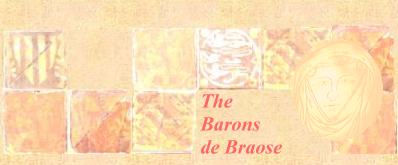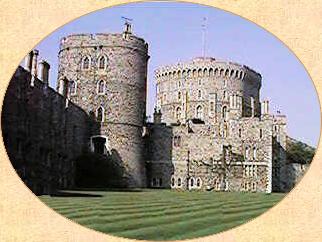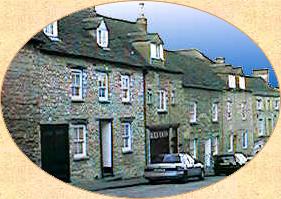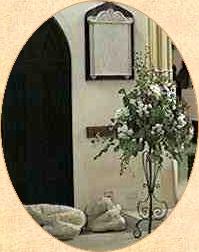
Fugitives

Maud and her family were
besieged at Meath but they managed to escape and headed for Scotland.
At Galloway Duncan of Carrick captured the fugitives and handed
them over to king John. Maud tried again to buy back the king's
favour with a promise of 50,000 marks (which she didn't have),
a sum equivalent to the annual revenue of England. Meanwhile,
her husband arranged the safe keeping of their eldest grandson
John in Gower.
William
de Braose narrowly escaped king John's pursuit. He dressed himself
as a beggar and fled to France via his home port of Shoreham.
John's fury turned murderous. He threw Maud and her son William
into Windsor castle. Others in the terrorised family
survived captivity but William, the heir, and his mother starved
to death in a Windsor dungeon.
 William
de Braose fanned the flames of rebellion when he reached Paris
by revealing the deadly secret which had prompted his promotion
and his fall. He told king Philip how John had murdered prince
Arthur. The story spread like wildfire. John killed Arthur with
his own hands during a drunken rage and threw the body in the
river Seine.
William
de Braose fanned the flames of rebellion when he reached Paris
by revealing the deadly secret which had prompted his promotion
and his fall. He told king Philip how John had murdered prince
Arthur. The story spread like wildfire. John killed Arthur with
his own hands during a drunken rage and threw the body in the
river Seine.
William died at Corbeil
within a year, in 1211. The Histoire des Ducs reports that he died "de duel" upon hearing of the fate of his wife and son, starved to death in a dungeon by order of King John. The words "de duel" translate as "of grief." William was believed to have met a tragic end, stricken by the horror of what had befallen his family.
 Giles
de Braose pledged to seek justice and revenge for his ruined
family, supported by his brother Reginald. The exiled archbishop
of Canterbury, Stephen Langton, buried their father in the abbey
of Saint Victor in Paris. The people of Tetbury
are said to have honoured him with a large monument.
Giles
de Braose pledged to seek justice and revenge for his ruined
family, supported by his brother Reginald. The exiled archbishop
of Canterbury, Stephen Langton, buried their father in the abbey
of Saint Victor in Paris. The people of Tetbury
are said to have honoured him with a large monument.
A memory of the terrible
fall of the de Braose family survives in Bramber. The figures
of two children have been seen in the village on Christmas eve
running hand in hand along the main street, pale and thin, as
though fleeing from the wrath of king John. William and Maud
had possibly seventeen children and many grandchildren.
Most reached adulthood but inevitably the fates of some are unrecorded.
The king was quick to distribute
the de Braose lands in return for support in the barons' wars
but he kept Bramber for himself. John enjoyed hunting at Knepp
and there are several royal letters addressed from Bramber.

back to text

back
to text

back
to text
 Fugitives |
||||||
 Maud and her family were besieged at Meath but they managed to escape and headed for Scotland. At Galloway Duncan of Carrick captured the fugitives and handed them over to king John. Maud tried again to buy back the king's favour with a promise of 50,000 marks (which she didn't have), a sum equivalent to the annual revenue of England. Meanwhile, her husband arranged the safe keeping of their eldest grandson John in Gower. William de Braose narrowly escaped king John's pursuit. He dressed himself as a beggar and fled to France via his home port of Shoreham. John's fury turned murderous. He threw Maud and her son William into Windsor castle. Others in the terrorised family survived captivity but William, the heir, and his mother starved to death in a Windsor dungeon.
William died at Corbeil within a year, in 1211. The Histoire des Ducs reports that he died "de duel" upon hearing of the fate of his wife and son, starved to death in a dungeon by order of King John. The words "de duel" translate as "of grief." William was believed to have met a tragic end, stricken by the horror of what had befallen his family.
A memory of the terrible fall of the de Braose family survives in Bramber. The figures of two children have been seen in the village on Christmas eve running hand in hand along the main street, pale and thin, as though fleeing from the wrath of king John. William and Maud had possibly seventeen children and many grandchildren. Most reached adulthood but inevitably the fates of some are unrecorded. The king was quick to distribute
the de Braose lands in return for support in the barons' wars
but he kept Bramber for himself. John enjoyed hunting at Knepp
and there are several royal letters addressed from Bramber.
|
||||||